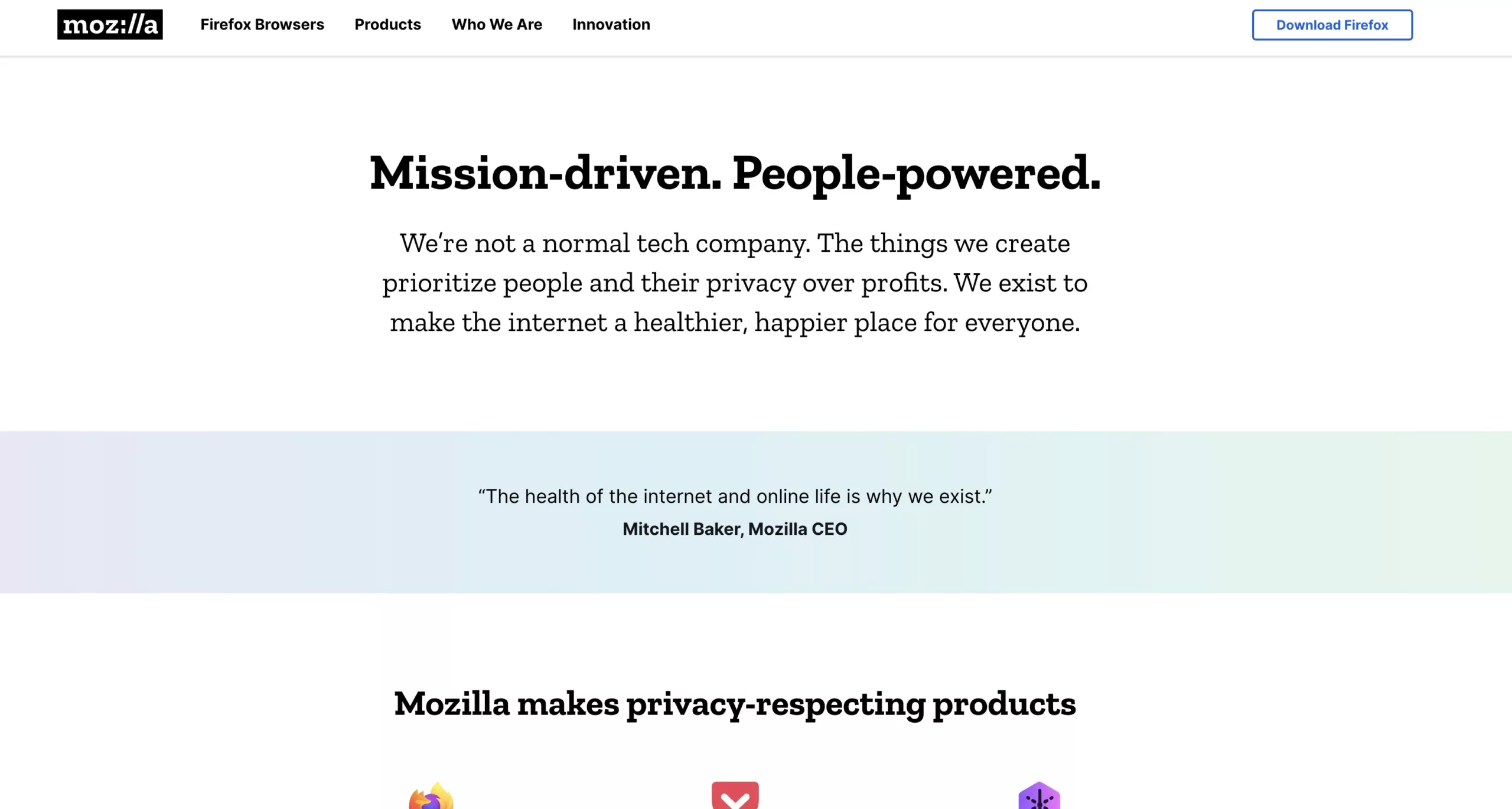Mozilla’s new website focused on tech in the public interest. For a long time, Firefox was Mozilla’s most recognizable product, but over the past few years, Mozilla has begun to expand beyond it. As Firefox’s influence has begun to decline.
Mozilla has made several startup investments, such as into Mastodon’s client Mammoth, and acquired Fakespot, a website and browser extension that helps users recognize fake reviews. Additionally, they recently launched Mozilla.org, a new website dedicated to technology in the public interest.
With an eye to the future, Surman outlined his vision of bringing Mozilla’s open-source ethos to the AI space. He believes that by engaging with the AI community and developing new open-source AI tools and platforms, Mozilla can help drive the development of a more responsible, ethical, and human-centered AI.
org to expand our mission beyond the browser and our activist identity. We have created a diverse portfolio of projects to ensure that our values are carried into the next era of the internet, commonly known as the AI era. Over the last year and a half, we have been working hard to make this dramatic shift.
At the time GPT-4 launched and the first Llama models became widely available, Surman declared this as a “focusing moment” for Mozilla AI. According to Surman, the organization had a broad mandate to seek out open-source, trustworthy AI opportunities and to create a business around them.
Moez Draief quickly proposed how to leverage the growing snowball of open-source large language models, accelerate it, and ensure it aligns with our goals and budget. Though Mozilla released some press about launching their AI efforts, they have not made much progress in that area since.
I asked Surman about the leadership team’s plans, and he said they had been working on them for nearly a year. However, as public interest in AI increased, he encouraged the team to take action. Then Draief reversed this decision and refocused their efforts on deciding on their next steps. He explained that their goal was to make it easier to use any of the open-source large language models in a trustworthy way, that respects privacy and is affordable.
Surman claims that most developers and consumers still struggle to run their models, despite the daily launch of more open-source models. Mozilla.ai is dedicated to creating a wrapper for any open-source large language model to enable fine-tuning, construct data pipelines, and enhance performance.
Mozilla acquired Fakespot, a startup that identifies fake reviews, to incorporate shopping tools into Firefox. We anticipate further details in the upcoming months. Meanwhile, the open-source and AI communities explore the possibilities of open-source AI.
We will work with other open-source projects in the first half of next year to clarify the definitions of the licenses and provide people with mental models.
Mauricio Santana/Getty Images captures a photo of Surman. He argues that open source AI is essential for making the next era of the internet accessible to everyone, but cannot do it alone. He contends that open-source organizations must join forces to create alternatives to the AI market, which is now dominated by a few well-funded players.
He compared it to the early days of open source, particularly the Linux movement, which sought to create an alternative to Microsoft. He then mentioned that when smartphones arrived, a few smaller projects attempted to create alternatives, such as Mozilla, and even Android, which is open source despite Google and other companies creating walled gardens around the user experience. However, these efforts were not very successful.
”Surman is optimistic about Mozilla’s capacity to leverage AI to further its mission and develop a sustainable business model. He stated, “Everything we do is in service of our mission. Some of it will be a public good, which we can pay for using our resources, philanthropy, and people pooling resources.”
We have developed a business model that is not strictly commercial, but we hope that the communal AI we are creating will have real enterprise value. By helping people use open-source large language models more efficiently and cost-effectively, we believe we can provide something of value to them.
Surman asserted that Mozilla is very prudent in incorporating AI into the browser, but he also contended that AI will become a part of every aspect of Mozilla. He declared, “We want to use AI in a way that is trustworthy and promotes people’s welfare.” Fakespot serves as an example of this, but the scope of the vision is more extensive.
He noted that an Edge-like chatbot in a sidebar could be one way to use the browser to represent you and incorporate AI into it to help you as you move through the internet. He suggested that the browser could evolve by providing features such as an assistant to help you summarize articles and notify you proactively. Over the next year, he expects that we will see this idea come to fruition.
Related: Find more on Tech
We must be more proactive in protecting users and providing them with helpful tools to navigate the internet more safely. Utilizing predictive analytics and synthesizing capabilities of these tools can make it easier and safer to move through the internet.


